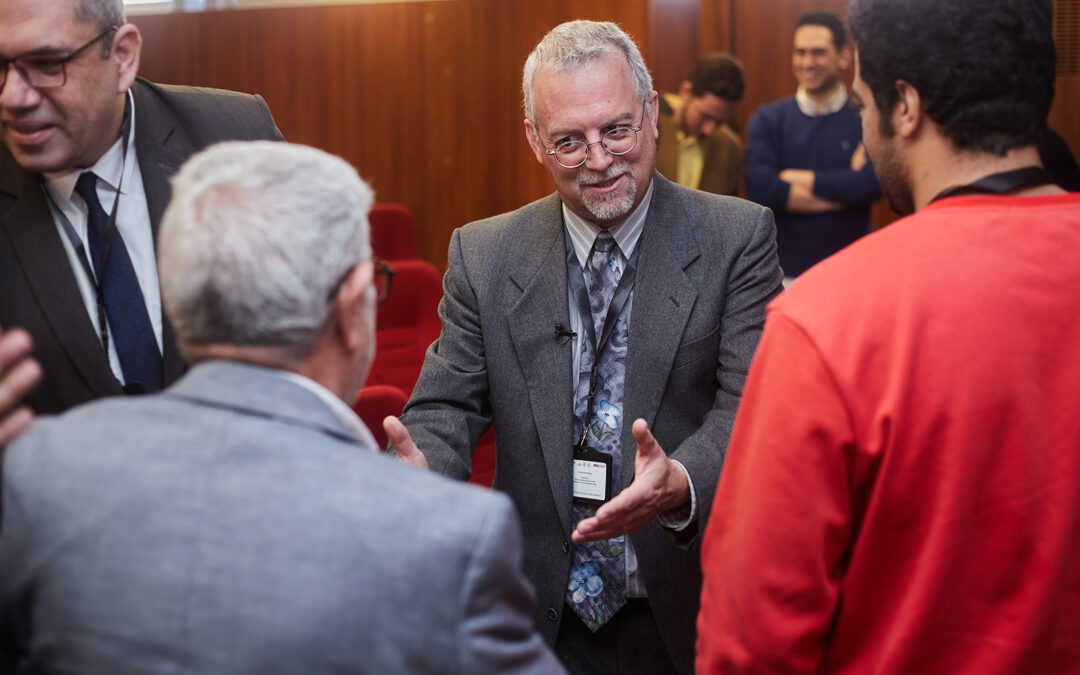USAID-funded Center of Excellence for Energy hosted energy transition workshop for faculty at Egyptian partner universities
CAIRO, EGYPT March 2023 – Director of the Center of Energy and Society at Arizona State University, Dr. Clark A. Miller led the “Transitioning Energy Systems to Carbon Neutrality: Opportunities and Challenges” workshop in Cairo on March 4, 2023. Hosted by the Center of Excellence for Energy, the workshop examined opportunities for leading countries, including the United States and Egypt, to tackle climate change by accelerating the decarbonization of energy systems and the creation of clean energy economies. It facilitated conversation about the energy challenges and transition amongst faculty at Arizona State University’s three Egyptian partner universities: Ain Shams, Mansoura, and Aswan, as well as other energy industry stakeholders.
Funded with the support of the American people through USAID, the Center of Excellence for Energy aims to support Egypt in reaching its target of 42% renewable energy by 2035. To do this, the center works closely with leadership and faculty at Egyptian partner universities, as well as leadership in governmental agencies, non-governmental organizations, and the energy industry, to increase higher education capacity and promote innovation, competition, and modernization of Egypt’s energy sector.
During this workshop, Dr. Miller assessed recent United States energy transition planning, in the context of broader energy transition dynamics in Europe and globally, reviewing the recently passed and most comprehensive climate change policies in history in the United States, which lay the foundation for reducing U.S. greenhouse gas emissions by 50% by 2030. At the center of these policies are extensive new investments in the deployment of renewable energy, the purchase of electric vehicles, the demonstration of innovative hydrogen and carbon capture technologies, and a unique commitment to ensuring that the transition to clean energy is just and equitable.
“The transition to clean energy is critical to creating a sustainable and thriving future for humanity. It will take the planet working together to get it done,” said Dr. Miller. “Thanks to the investments contained in recent legislation, the United States is now positioned to help lead a global transformation of energy systems.”
Dr, Miller and three energy industry panelists: Dr. Maged Mahmoud from the Regional Center for Renewable Energy and Energy Efficiency, Eng. Ahmed Esmat from Elsewedy, and Eng. Karim Nashaat from Services BU, discussed how the center could help support industry needs through curriculum and research activities. Panelists and participants at the workshop also discussed Egypt’s leadership of the 2022 United Nations Climate Change Conference (COP27) in Sharm el-Sheikh, including Egyptian visions for clean energy and the potential to contribute to a new energy economy in the Mediterranean region. The discussion emphasized the importance of the energy transition and its connection to food supply and the need to establish a sustainable energy plan for Egypt.
“It is vital to bring together higher education faculty, energy industry stakeholders, and governmental agencies to discuss Egypt’s energy challenges and how to address them to advance the energy transition,” says Dr. Sayfe Kiaei, project director for the Center of Excellence for Energy. “One of the Center of Excellence for Energy’s roles is to facilitate conversations like this one and provide guidance to developing higher education capacity and a skilled energy workforce.”
Arizona State University has been operating the Center of Excellence for Energy since 2021 in partnership with its Egyptian partner universities: Ain Shams University, Mansoura University, and Aswan University.
For more information on the workshop and to learn about future opportunities for engagement with the center, visit Center of Excellence for Energy.
Dr. Miller is an expert in United States energy transition strategy and in the human and organizational dimensions of transition management and leadership. For the past three years, he has served as a member of the U.S. National Academies Committee on Accelerating Decarbonization of the U.S. Energy System, which is charged with charting a path to a net zero U.S. economy by 2050. He has also advised numerous electric utilities, national laboratories, and governments on pathways to carbon neutrality for regional economies, enhancing social equity and justice in energy planning, and managing organizational change to catalyze clean energy technology deployment. At Arizona State University, he directs the Center for Energy and Society, one of the largest U.S. centers for social and economic research on energy transitions. He also serves as associate director for faculty in the School for the Future of Innovation in Society, one of ASU’s newest interdisciplinary schools, with faculty from over 40+ disciplines, focused on charting more inclusive and sustainable human technological futures. Dr. Miller received his Bachelor of Science and PhD in electrical engineering from the University of Illinois and Cornell University.
The Center of Excellence for Energy is funded by USAID with the support of the American people with a goal to help Egypt reach its target of 42% renewable energy by 2035 and position the country as a regional leader in clean energy. The center is operated by Arizona State University in partnership with three Egyptian universities: Ain Shams, Mansoura, and Aswan.
The U.S. Agency for International Development administers the U.S. foreign assistance program providing economic and humanitarian assistance in more than 80 countries worldwide.
This announcement is made possible by the generous support of the American people through the United States Agency for International Development (USAID). The contents are the responsibility of Center of Excellence for Energy and do not necessarily reflect the views of USAID or the United States Government.
###
